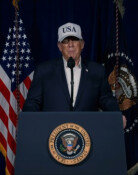[Editorial] What Created the False Prophet Minerva?"
[Editorial] What Created the False Prophet Minerva?"
Posted January. 10, 2009 06:52,
An Internet pundit who stirred up controversy in the wake of the U.S.-led financial crisis with economic predictions under the pseudonym Minerva turned out to be a jobless man who stayed indoors all day posting on the Web. Contrary to his description of working for a foreign financial company, the 31-year-old man is found to have worked at two manufacturers after graduating from a junior college. With shallow knowledge of economics gained from books and the Internet, he rocked the nation by creating a Minerva syndrome.
The Internet is a messy space where truth and lies are mixed. While some say the Web has bred a smart mob, others complain of the dull and thoughtless generation it has led to lacking intelligence and reason. On the Internet, collective intelligence and digital insanity co-exist. This is why education on digital literacy helping people sort out the right information from the wrong is badly required.
An anonymous writer gained huge popularity and was even hailed as an economy president by netizens. This illustrates Korean society is easily gripped by emotion and groundless instigation rather than reason and science. Intellectuals and experts must engage in self-reflection facing this deplorable situation. Though some of the predictions he posted on the Web were true, his line of logic was coarse at best in the eyes of those having knowledge of economics to a certain degree. Yet most intellectuals and experts kept mum and failed to counter his arguments.
Certain intellectuals deserve the blame for fueling the syndrome. Sungkyunkwan University economics professor Kim Tae-dong, who served as presidential secretary for economy under the Kim Dae-jung administration, praised Park, saying, Hes the greatest mentor Ive ever met.
Seoul National University professor Kim Sang-jong said, Given that a civilians economic analyses have gained more public trust than those of the government, civilian intellectuals like Minerva will keep emerging.
Most of the blame falls on the government, however, for having let Minerva have his way with his distorted predictions. Netizens ridiculed the government for being less competent than Minerva in predictions. It is no exaggeration to say all economy-related ministries were trampled by an amateur instigator. When Parks writings began influencing the public, the government should have refuted his arguments with logic and persuaded the people not to be deceived by groundless predictions.
When Park was taken into custody, left-leaning civic groups raised questions over punishing the Internet pundit for making the government uncomfortable, saying it will undermine freedom of speech. Yet he should be held culpable for spreading a false rumor that can create confusion in the market. In one post, he said, The government sent memorandums urging withhold of dollar purchases to major financial institutions and exporters. A revamp of law and order is urgently needed to crack down on those who defame individuals and create chaos by spreading false rumors under the cover of anonymity.
Internet portal sites are also responsible. Park is alleged to have put up more than 500 posts on the online discussion forum Agora at the Internet portal Daum. The forum provoked three months of candlelight protests against U.S. beef imports by spreading false rumors on mad cow disease. Since then, it has continued to stir up social conflict with unfounded and near-sighted arguments. With Internet portals wielding formidable influence on the public, the government must make them take their share of responsibility.
After Parks identity was released, the majority of the people might have felt as if they had been deceived by a cult leader. But another Minerva can sway netizens and create social confusion. To prevent deception by false and incendiary pundits, the Internet must be transformed into a space where reason and science dominate.



![[단독]폴란드, 韓 해군 최초 잠수함 ‘장보고함’ 무상 양도 안받기로](https://dimg.donga.com/c/138/175/90/1/wps/NEWS/IMAGE/2026/02/27/133437397.1.jpg)


![“‘표심’ 따라 이란 친 트럼프…지독하게 변덕스럽지만 치밀해” [트럼피디아] 〈60〉](https://dimg.donga.com/c/138/175/90/1/wps/NEWS/IMAGE/2026/03/01/133441726.1.jpg)
